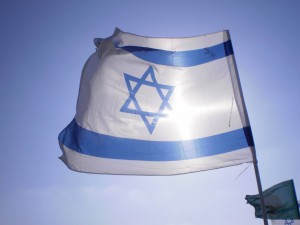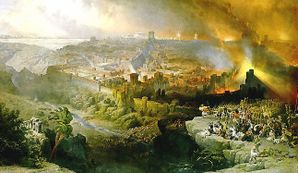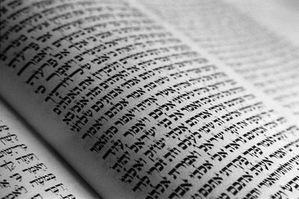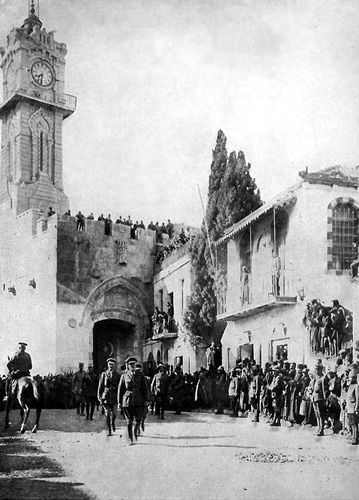Why I’m Pro Israel
 As I’m writing this article, I already hear the outburst of criticism, insults, objections and gestures of despise, and maybe even hatred, that such a statement will bring upon me. But inspite of all the anger and objections that I’m about to generate, I’m indeed going to make a clear statement and explain why I’m Pro Israel.
As I’m writing this article, I already hear the outburst of criticism, insults, objections and gestures of despise, and maybe even hatred, that such a statement will bring upon me. But inspite of all the anger and objections that I’m about to generate, I’m indeed going to make a clear statement and explain why I’m Pro Israel.
To prevent accusations of partiality, let me say that I’m not a Jew.  There are, indeed, in my mother’s lineage some traces of Jewishness but certainly not enough for me to be considered, or to feel, Jewish. I don’t work in finance or show businesses and therefore I have no career or financial interest in making this statement and for conspiracy theorists, I open too much my mouth to be a secret agent of Mossad. I don’t even have any jewish friends. I do know one or two, I do have been around one or two others but I have no personal, romantic or friendly relations that would influence my statement. I’m not a fan of French Jewish show-biz stars Patrick Bruel, Enrico Macias, Shirel, Elie Semoun, or Arthur even if I like Gad Elmaleh. I hate French philosopher and media star Bernard-Henri Levy, his haircut, his shirts and the fact that he poses on Libyan tanks wrecks in fashion costumes. As for French Foreign Affairs Minister Laurent Fabius and for former IMF chief Dominique Strauss-Khan, both Jewish by birth, it wouldn’t be suitable to write here the contempt I hold against them. The only contemporary Jewish individual for whom I do have a full measure of admiration is Israeli Air Force Colonel Giora Epstein, a physically and technically exceptional soldier and the best fighter pilot and ace of the jet age with 17 air kills over enemy aircraft. In brief, I do not preach for my parish, I do not defend my blood, I do not favour friends and I’m not soothing the feathers of my crooked nose banker.
There are, indeed, in my mother’s lineage some traces of Jewishness but certainly not enough for me to be considered, or to feel, Jewish. I don’t work in finance or show businesses and therefore I have no career or financial interest in making this statement and for conspiracy theorists, I open too much my mouth to be a secret agent of Mossad. I don’t even have any jewish friends. I do know one or two, I do have been around one or two others but I have no personal, romantic or friendly relations that would influence my statement. I’m not a fan of French Jewish show-biz stars Patrick Bruel, Enrico Macias, Shirel, Elie Semoun, or Arthur even if I like Gad Elmaleh. I hate French philosopher and media star Bernard-Henri Levy, his haircut, his shirts and the fact that he poses on Libyan tanks wrecks in fashion costumes. As for French Foreign Affairs Minister Laurent Fabius and for former IMF chief Dominique Strauss-Khan, both Jewish by birth, it wouldn’t be suitable to write here the contempt I hold against them. The only contemporary Jewish individual for whom I do have a full measure of admiration is Israeli Air Force Colonel Giora Epstein, a physically and technically exceptional soldier and the best fighter pilot and ace of the jet age with 17 air kills over enemy aircraft. In brief, I do not preach for my parish, I do not defend my blood, I do not favour friends and I’m not soothing the feathers of my crooked nose banker.
The partiality that I must confess, though, is that I’m a Christian believer who reads the Bible and who is very sensitive to the Jewish people, their history, their role and significance in the biblical message. These subjective elements established, I feel free to make my statement without having to constantly battle off usual prejudice.
A proud, free and independent people
The Jews are nowadays maybe the oldest non-primitive people in history. Where all other peoples from Antiquity have been drowned in multiple conquests and assimilations, the Jews can be dated back to the gates of prehistoric times. Since their very beginnings, first as the twelve founding brothers of the twelve tribes of Israel, they were fiercely independent and free. Of course, you will object that they were slaves in Egypt! But their freedom from slavery was the first great abolitionist struggle in history and almost sent mighty Egypt to its knees. Non-historic biblical myths, will you protest! Please remember the only partiality that I confess. The Bible is THE book, THE Word of God. If you want to convince me that I’m wrong, go convince Hitler to love the Jews, it’ll be easier. And even if you consider this story only as a myth, it is still a founding legend of the Jewish Nation, which enlightens its commitment to freedom and independence.
After becoming a sovereign state, they never were a great empire and never even wished to be. They are one of the few peoples in history who stuck to their few acres of land. After the initial conquest of Canaan, God’s promised land, they never pursued any imperialist desire towards their neighbours, inspite of unending wars with them. The only nation that was entirely conquered and destroyed by Israel was Amalek. The Amalekites were such a threat to the very survival of Israel that God ordered their annihilation. God’s order shows that it was not to be an economic conquest but a fight for survival as no spoil should be gained. Amalek was to be destroyed entirely, including their belongings and livestock. King Saul’s disobedience to this order would lead to his downfall under God’s wrath. Religious nonsense, will you claim again? At the very least, it’s another founding legend of the Jewish people’s mentality as it is written it the Torah.
It is wrong to presume they had to conquer and destroy all the inhabitants of Canaan in order to settle them. Foreigners who wished to live among the Jewish people were openly accepted. Israel is one the first nation to adopt a legal status for foreigners among itself, as recorded in the Torah. Israel’s history also includes foreigners, perfectly assimilated and even decisive in Israel’s fate. Ruth the Moabite is not a Jew but still becomes King David’s great –grandmother and King David himself will entrust foreigners with important missions such as Hushai the Archite, sent to spy on his son Absalom’s rebellion or even Uriah the Hittite who, before being trapped by David to steal his wife, is one of his army officers. David’s crime on Uriah will even be met by a dramatic answer, in his own flesh, that will show him he is not above the Law, in a time where arbitrary absolutism is commonplace.
Surprisingly, the stories of the Kings and Chronicles of Israel show a very particular and premature form of separation of powers. The Law, promulgated by God, is enforced upon all, including the King himself who cannot evade it without being recalled to his duties by God’s Prophets, acting like a judiciary power, opposing royal policies and imposing measures to the governments of Israel and Judah after the secession. The absence of royal absolutism is obvious when Queen Jezebel, a Sidonian princess who is not used to opposition, simply cannot understand why her husband King Ahab is powerless when the common citizen Naboth refuses to sell him his vineyard.
At the crossroads of most mighty empires of Antiquity, the two Jewish kingdoms of Israel and Judah will always resist the great Powers, always trying by any means to preserve their independence or to restore it when lost. This unyielding will of freedom will bring about them unending wars against their neighbours’ imperialism and many times in history, it will result in blood, ashes, deportations and complete destructions of their cities and capitals.  Even the word submission sounds strange in this case because, usually there was nothing left to submit, the material, social and economic destruction being thoroughly total. The Assyrian and Babylonian Kings would have to besiege and conquer Jerusalem several times, deporting the leading Jewish class and set puppet governments, only to see these also turn against them to restore independence. Nebuchadnezzar II will completely destroy Jerusalem and will deport most of the Jewish people to Mesopotamia, reason why there were large Jewish communities in Iraq and Iran up to the middle of the 2Oth century. The Romans will go even further in 70 AD and 135 AD by destroying Jerusalem almost stone by stone, slaughtering in large numbers and deporting the remnants of the people that came back from Mesopotamia to create a new, if not independent at least autonomous, government. The Romans will even rename Jerusalem to Aelia Capitolina to show the Jews nothing was left of their land, traditions and heritage.
Even the word submission sounds strange in this case because, usually there was nothing left to submit, the material, social and economic destruction being thoroughly total. The Assyrian and Babylonian Kings would have to besiege and conquer Jerusalem several times, deporting the leading Jewish class and set puppet governments, only to see these also turn against them to restore independence. Nebuchadnezzar II will completely destroy Jerusalem and will deport most of the Jewish people to Mesopotamia, reason why there were large Jewish communities in Iraq and Iran up to the middle of the 2Oth century. The Romans will go even further in 70 AD and 135 AD by destroying Jerusalem almost stone by stone, slaughtering in large numbers and deporting the remnants of the people that came back from Mesopotamia to create a new, if not independent at least autonomous, government. The Romans will even rename Jerusalem to Aelia Capitolina to show the Jews nothing was left of their land, traditions and heritage.
But, inspite of everything and while the Egyptian, Assyrian, Babylonian, Persian, Greek, Roman, Muslim and Ottoman empires have disappeared, the Jewish people still exists and are still faithful to their land, traditions, language and heritage. This spirit of resistance to imperialism and totalitarianism, although powerful compared to Jewish weakness, has brought them through centuries and has let them bury all their enemies. Add to this list the European empires that segregated and expelled them, Czarist Russia that invented the word “pogrom”, the French 3rdRepublic that roared against Jewish traitors during the Dreyfus Case, the 3rdReich that enacted their extermination and the USSR that secretly continued czarist persecutions. During almost 19 centuries, while trying as best they could to survive within their many adoptive countries (that can almost be called “concentration countries” in the Nazi way for some), they never ceased repeating at each Passover: “Next year in Jerusalem”, indomitable and fierce in their will to go home and retrieve their nation. Which people can claim the same? The Assyrians have gone and Babylon is no more than an open sky museum. The Persians have gone and Persepolis with them. The Romans themselves left Rome for Ravenna. The Byzantines have melted with the Turks and have forgotten Constantinople. The Gauls no longer exist and we’re not even sure where Alesia actually was.
 Their surprising capability to resist adversity is all the more confirmed by the four wars in forty years since the State of Israel was created in 1947. With no army, no equipment, no trained soldiers and no reserves, crushed by a blockade on weapons and heavily outnumbered, they changed the course of events and saved their brand new nation with feats of arms for which the word glorious is almost weak. In 1956, 1967 and 1973 no matter who and what they were facing, they prevailed, fighting even further than reason can accept. It is often said, in warfare, that victory belongs to those who want it the most and each time, the Jews proved their exceptional will and a courage to move mountains.
Their surprising capability to resist adversity is all the more confirmed by the four wars in forty years since the State of Israel was created in 1947. With no army, no equipment, no trained soldiers and no reserves, crushed by a blockade on weapons and heavily outnumbered, they changed the course of events and saved their brand new nation with feats of arms for which the word glorious is almost weak. In 1956, 1967 and 1973 no matter who and what they were facing, they prevailed, fighting even further than reason can accept. It is often said, in warfare, that victory belongs to those who want it the most and each time, the Jews proved their exceptional will and a courage to move mountains.
You can hate them because they are foreigners in your country, because they kept their culture, their traditions, their faith. You can despise them because they did not completely become you. You may want to erase them because you think they are low class race of parasites. Or you can hate them for their resilient independence and their “chosen people” arrogance that they have learned to hide. Whatever the kind of hatred they encountered, they made through time with their history, their traditions, their language, their faith with stubbornness and courage. What an amazing paradox that Hitler, who praised the idea of a pure people, rooted in history, a superior race that can survive and triumph over any ordeal, assaulted the very people that embodies this idea!
A modern nation’s economic miracle
Without getting in the jungle of statistics and charts, there is one fact on which historians and economists agree. Only two countries in the last fifty achieved distinction of becoming developed nations, starting from nothing: South Korea and Israel. Without natural or resources, starting from an under-developed region of the Ottoman Empire whose economy was based on livestock, fishing and craftsmanship, Israel is now a leading country in high-tech and network industries, high level medical and surgical research and industrial agriculture, having successfully cultivated fertile ground in the desert, a feat unique in history. Israel’s standard of living is equivalent to western nations, with a similar life expectancy. The education system is excellent and Israeli universities producer internationally recognized engineers, scientists and intellectuals.
 This development, of course, is made in spite of and under the constant threat of neighbour countries that only very slowly recognize Israel while major regional powers refuse to do so. The country is surrounded by radical Islamic terrorist groups, Hezbollah in Lebanon, Al Aqsa Martyrs Brigade and Islamic Jihad in the West Bank, Hamas in the Gaza Strip and Salafist groups linked to Al Qaeda in the Sinai Desert.
This development, of course, is made in spite of and under the constant threat of neighbour countries that only very slowly recognize Israel while major regional powers refuse to do so. The country is surrounded by radical Islamic terrorist groups, Hezbollah in Lebanon, Al Aqsa Martyrs Brigade and Islamic Jihad in the West Bank, Hamas in the Gaza Strip and Salafist groups linked to Al Qaeda in the Sinai Desert.
Under constant conventional as well as terrorist threat, Israeli society and economy are models. Israel is a free, democratic country, based on the rule of law, protecting freedom of speech and of press. One should only consider a former president jailed for rape and sexual abuse or the way Israeli press harassed Armed Forces officials during the 2006 campaign in Lebanon.
Democratic freedom of choice works very well, as the three major parties of the left, center and right wings have held in office, sometimes in coalitions that do not freeze the institutions and the electoral process is proven, working without major flaws and with integrity levels equivalent to western countries.
As of citizenship, Israel is role model for successful integration. Even if Judaism and Jewish immigration are essential factors, they are not exclusive. Becoming a Israeli citizen is open and easy, as Christian and Muslim Israelis from various ethnic backgrounds can witness, even forming elite units of the Israeli Armed Forces such as the Druze Herev Battalion or the Desert Reconnaissance Bedouins Battalion to whom surveillance of the delicate southern border is entrusted. Integration of Jews from around the world is also a marvel of openness of society, each community contributing its difference to the wider Israeli community. The variety of languages, origins and cultures inside the Israeli society makes it one of the largest and most successful melting pots in history. Charges of Apartheid, commonly brought against Israel, do not stand for a single second when facing facts. A policy of defiance and defence towards the Arab populations which refuse assimilation is indeed implemented but those who wish assimilation are welcome without any discrimination or segregation.  The Knesset, Israel’s Parliament, even has Arab members who are fully free to speak, even when it sometimes oppose Israeli interests.
The Knesset, Israel’s Parliament, even has Arab members who are fully free to speak, even when it sometimes oppose Israeli interests.
One remarkable feat that must be emphasized, as a mark of Israeli society vitality, is the rehabilitation and resurrection, as a living and official language, of Hebrew which was considered and spoken as a religious idiom. Another amazing evidence of the resilience of this people and its indomitable identity!
One can only note the historical and traditional principles of Israeli society -equality before law, rejection of tyranny, separation of powers, the welcoming and assimilation of foreigners -still permeate modern life and institutions in Israel. The more one thinks, the more one realizes that our western political model of individual freedom and responsibility of the citizen in a tolerant and open democratic rule of law is clearly influenced by the traditional Israeli model and not limited to the ancient Greek or Christianity. Israel’s existence today and the natural way it implements these principles inspite of centuries of exile and diverse political influences is a particular evidence of the universality and permanence of these values when they are not twisted or forsaken.
What about Palestinians?
In this fine portrait of Jews and Israel, my opponents are already loading their arguments that can be summed up in one sentence: Palestinians’ fate is the only necessary evidence that everything I say is wrong. But here’s my answer.
 The word “Palestine” was created by the Roman invaders after having destroyed what was then Judea and Jerusalem, deported its population and forbade them by law to return. To destroy every residual Jewish resistance to Roman domination, the method chosen was to morally rape them and to permanently redefine everything including the land. By romanizing it, latinizing the names, by encouraging immigration coming from the Desert nomadic peoples, the Romans hoped to finally cut every roots of the Jewish dream of sovereignty and independence in their homeland. But history shows the Jews have always tried to come back. During the Muslim and Crusader invasions, the Jews were there though a minority. During the Muslim era, Jerusalem and the old Judea now called Palestine were only a region of various Muslim empires. By the way, the region does not attract much interest and does not see an important cultural or economic development. Aside from the sacred significance of Jerusalem in Islam, even if the Quranic verses that seem to designate Jerusalem must be considered with caution, this land is only a Muslim conquest that is now considered part of the Muslim community as all conquered lands. The idea of an Arab nation and identity was born during the Ottoman domination and is not as much linked to the land as to ethical considerations. Arabs briefly dream of a large Arab nation including Egypt, Palestine, Jordan, Lebanon and Syria. When the British conquer Palestine in 1917, there was nothing as a claim of a Palestinian Arab State and there would not be any before 1970. What the Palestine Arabs want is not a Palestinian State but the integration of Palestine in the large Arab kingdom led by the Hashemite dynasty. It is therefore only natural to reject the 1947 Partition Plan since the only state they feel loyal to already exists east of the Jordan River.
The word “Palestine” was created by the Roman invaders after having destroyed what was then Judea and Jerusalem, deported its population and forbade them by law to return. To destroy every residual Jewish resistance to Roman domination, the method chosen was to morally rape them and to permanently redefine everything including the land. By romanizing it, latinizing the names, by encouraging immigration coming from the Desert nomadic peoples, the Romans hoped to finally cut every roots of the Jewish dream of sovereignty and independence in their homeland. But history shows the Jews have always tried to come back. During the Muslim and Crusader invasions, the Jews were there though a minority. During the Muslim era, Jerusalem and the old Judea now called Palestine were only a region of various Muslim empires. By the way, the region does not attract much interest and does not see an important cultural or economic development. Aside from the sacred significance of Jerusalem in Islam, even if the Quranic verses that seem to designate Jerusalem must be considered with caution, this land is only a Muslim conquest that is now considered part of the Muslim community as all conquered lands. The idea of an Arab nation and identity was born during the Ottoman domination and is not as much linked to the land as to ethical considerations. Arabs briefly dream of a large Arab nation including Egypt, Palestine, Jordan, Lebanon and Syria. When the British conquer Palestine in 1917, there was nothing as a claim of a Palestinian Arab State and there would not be any before 1970. What the Palestine Arabs want is not a Palestinian State but the integration of Palestine in the large Arab kingdom led by the Hashemite dynasty. It is therefore only natural to reject the 1947 Partition Plan since the only state they feel loyal to already exists east of the Jordan River.
The Palestinians’ commitment to this land has no common measure with that of the Jews. The only time in history the Jews had a country, a state, a code of laws and a government was on this land. They wished no other and still do. Their only political and spiritual capital has always been Jerusalem. For the Arabs and Turks, it was only an under developed region inside a wider Muslim empire in constant expansion whose capital was either in Baghdad, Damascus or Constantinople and whose spiritual center was in Mecca and Medina before Jerusalem. When Zionism influenced European Jews to emigrate to Ottoman Palestine in late 19th Century, Jerusalem was already to a majority of Jews, as noted by French author Chateaubriand. And it is this immigration of men, competences and funds that made Palestine attractive again for Arabs. Selling land to Jews brings unexpected funds that fuels a constantly growing local economy, thus creating jobs. Palestinians see their living standards improving, their way of life becoming more civilised. Many can leave their flocks to become farm workers or craftsmen or start small businesses.
But if the Jews do have in their religious and traditional codes a status for integrated foreigners, the Muslims are religiously not allowed to live under a non-muslim sovereignty. When Zionist claims to autonomy and independence became prominent, tensions and conflicts erupted and worsened until the UN Partition Plan of 1947. The plan was accepted without conditions by Israel which was granted a coastal strip and a desert, leaving most of the land to Palestinians who rejected the plan to claim all the land. They chose an armed confrontation as the means to return to them estates that had been sold legally. In doing so, they were grasping an economic structure they were never able to create and rejected bluntly the very idea of sharing, negotiating and of reaching compromises with the Jews, boldly stating they would push them back into the sea.
 The Palestinian tragedy lies there, in this permanent refusal of sharing and negotiation. In 1948, rather that accepting defeat and building peace that could have led to a negotiated and acceptable solution for all, the Arab leaders called their people to exile, throwing hundreds of thousands of their fellow countrymen in refugee camps in Lebanon and Jordan, leaving Palestine open for military action and recapture against Israel. But they never succeeded and let the refugees situation become a security challenge for Jordan who will settle it in blood in September 1970. Similarly, Lebanon, unable to deal with Yasser Arafat’s PLO becoming a state within the state, will fall into a 15 years civil war. Since then, no matter what the peace plans, the work sheets, the negotiations and other attempts to conciliation, Palestinians have always chosen the hard way, confrontation and conflict, requiring Israelis to make impossible compromises and setting conditions they know Israeli leaders cannot and won’t meet. This never-ending conflict, of which they are themselves the willing hostages, can only be settled, according to them, with the downfall of Israel.
The Palestinian tragedy lies there, in this permanent refusal of sharing and negotiation. In 1948, rather that accepting defeat and building peace that could have led to a negotiated and acceptable solution for all, the Arab leaders called their people to exile, throwing hundreds of thousands of their fellow countrymen in refugee camps in Lebanon and Jordan, leaving Palestine open for military action and recapture against Israel. But they never succeeded and let the refugees situation become a security challenge for Jordan who will settle it in blood in September 1970. Similarly, Lebanon, unable to deal with Yasser Arafat’s PLO becoming a state within the state, will fall into a 15 years civil war. Since then, no matter what the peace plans, the work sheets, the negotiations and other attempts to conciliation, Palestinians have always chosen the hard way, confrontation and conflict, requiring Israelis to make impossible compromises and setting conditions they know Israeli leaders cannot and won’t meet. This never-ending conflict, of which they are themselves the willing hostages, can only be settled, according to them, with the downfall of Israel.
But let’s go even further and use our imagination. If Palestinians had accepted the Partition Plan in 1947 and created the state they are now asking for, is there simply one little reason to think that Palestine would today be in a better shape than its Syrian, Egyptian, Iraqi or Lebanese neighbours, with their dictators, their soviet-style planned economies that are disasters, their violent, under-educated societies in constant decline and under the threat of the worst fundamentalist extremism? The way the Gaza strip is operated by a de facto autonomous government is enough evidence. The human, social and economic disaster is total and accusing Israel is nothing but a fairy tale. Either Egypt, Syria, Lebanon, Iraq, Iran, Libya, Algeria, even Jordan which is still in better shape, no Arab state of the Mediterranean or Mesopotamia, although independent and freely governed, has achieved a stable society served by a prosperous economy with the demographic standards of modern nations. A Palestinian State would have in no way escaped this sad fate.
I have made my decision
Of course, it would be easy to think that I’m glorifying Israel and demonizing the Palestinians. I could easily be opposed with some abuses or crimes committed by Israeli troops, with the injustice of the West Bank colonization policy, with the disproportioned retaliations to rockets fired from the Gaza strip, with the fate of Palestinian children held at gunpoint by Zahal soldiers.
I know all this. I’m not saying Israel is perfect, that its army is exemplary, that its policy is just and that I would give a blank check to the Israeli government.
I note that Israel is a democratic nation based on the rule of law with strong institutions. I note that Israel favours economic development of its population, Jewish or not, in a spirit of freedom, equality and pursuit of happiness. I note that, in regard of the behaviour of the British forces in their colonies, French in theirs, Russian in Germany or Afghanistan, German in Europe, American in Vietnam, Afghanistan and Iraq and Arab in their own countries, Israeli forces have shown they are capable of restraint, discipline and humanity and they should be congratulated rather than condemned.
As for Israeli colonization policy, I have a very different view than the usual dichotomy. What if it was the best thing that could happen to Palestinians? What if the Israelis, at last rid of the fear of terrorists and extermination by Arab forces, could follow their tradition of Israel’s fully integrated foreign friends, already lived by many Arabs that would not turn from it? What if the colonies brought funds, allowed businesses to open, created jobs and returned to smart Palestinians the hope of a better life far from stupid conflicts and from an Arab nationalism that has proven in every way a lamentable failure? What if Palestinians became, by a welcome mind opening and by putting an end to their unyielding bellicosity, the modern Ruth the Moabite, Hushai the Archite and Uriah the Hittite? What if, rather than uselessly promoting a two states solution that will never work, we encouraged Palestinians to settle peace right away, without conditions, and to build their lives in an Israeli nation that welcomes so much foreign cultures that it has all the keys to do it the best way? What if we encouraged Palestinian leaders to stop waving impossible ultimatums to finally address their people’s true problems and allow it to have a share of the social and economic miracle Israel has created?
I have made my decision and it is very clear. I’m pro-Israel, I’m even pro-Zionism because I believe in the extension of the Israeli state to Palestinian territories and the integration of their population, in good feelings and good will, in the Israeli nation and I’m pro-Jew because it is an admirable people that lives through the ages of time showing an exceptional resistance, a remarkable sense of freedom of equality, a touching attachment to its land, its ancient culture and traditions and that still is on the front line of modernity and of future’s challenges.
Long lives Israel and I call upon the leaders of the Western nations for them at last to support, without ambiguity and without false empathy towards irresponsible Palestinian leaders, the only democratic nation based on the rule of law that is an example for the Middle East and for many western nations who lose their values in a few decades!
Pug – november 16, 2014
